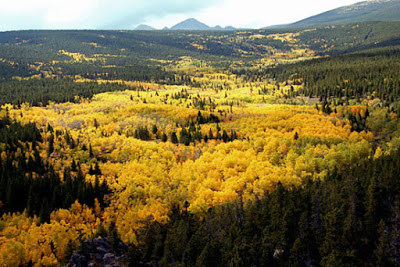An Enormous "Blob" In Utah Is Up To 80,000 Years Old And Among Earth's Oldest Organisms [View all]
Pando covers 42.6 hectares, and its name means “I spread”.
Rachael Funnell
Writer & Senior Digital Producer
- click link for images -
https://assets.iflscience.com/assets/articleNo/80077/aImg/85233/pando-l.webp
An aerial view of Pando the “I spread” aspen doing what it does best.
Image Credit: Lance Oditt, CC BY-SA 4.0, via Wikimedia Commons
A massive blob lives in Utah, and its name is Pando, which literally means “I spread”. The sprawling lump of quaking aspen (Populus tremuloides) has lived up to its name in spreading across 42.6 hectares (105.3 acres) in Fishlake National Forest with a network of 47,000 stems that were created through asexual reproduction, essentially making Pando a giant tangle of clones. That means it’s technically a single tree, one of the largest organisms on Earth, and we now know it’s one of the oldest, too.
A preprint looked at Pando's genetic data and concluded that its age ranges between 16,000 and 80,000 years old. While clones are exact copies of each other, they can still independently develop different genetic mutations as they divide, so the team was also excited to see what its genetic variation could reveal about the secret to living a long and massive life.
Pando’s sexless life is the result of being triploid, which means it has three copies of each chromosome in its cells instead of two. Sexual reproduction off the cards, Pando instead clones itself, but it may be a perk for longevity as the researchers say triploid could mean “bigger cells, bigger organisms, better fitness” – good news for something that's slowly being eaten by deer.
From one seedling to tens of thousands of iterations, Pando has put in quite the shift and the scientists were curious to see what changes have unfolded in its many stems. Curiously, this kind of genetic variation in a clonal animal is something that nobody had really studied in Pando before.
More:
https://www.iflscience.com/an-enormous-blob-in-utah-is-up-to-80000-years-old-and-among-earths-oldest-organisms-80077

Pando aspen grove at Fishlake National Forest
Pando Wikipedia:
https://en.wikipedia.org/wiki/Pando_%28tree%29






